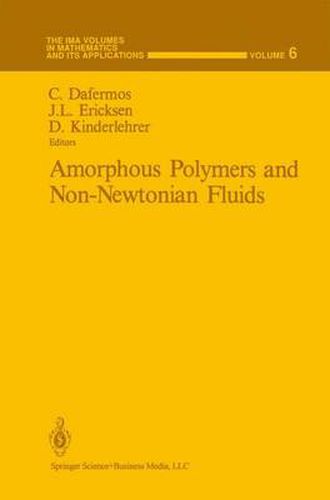Readings Newsletter
Become a Readings Member to make your shopping experience even easier.
Sign in or sign up for free!
You’re not far away from qualifying for FREE standard shipping within Australia
You’ve qualified for FREE standard shipping within Australia
The cart is loading…






This title is printed to order. This book may have been self-published. If so, we cannot guarantee the quality of the content. In the main most books will have gone through the editing process however some may not. We therefore suggest that you be aware of this before ordering this book. If in doubt check either the author or publisher’s details as we are unable to accept any returns unless they are faulty. Please contact us if you have any questions.
This IMA Volume in Mathematics and its Applications AMORPHOUS POLYMERS AND NON-NEWTONIAN FLUIDS is in part the proceedings of a workshop which was an integral part of the 1984-85 IMA program on CONTINUUM PHYSICS AND PARTIAL DIFFERENTIAL EQUATIONS We are grateful to the Scientific Committee: Haim Brezis Constantine Dafermos Jerry Ericksen David Kinderlehrer for planning and implementing an exciting and stimulating year-long program. We espe cially thank the Program Organizers, Jerry Ericksen, David Kinderlehrer, Stephen Prager and Matthew Tirrell for organizing a workshop which brought together scientists and mathematicians in a variety of areas for a fruitful exchange of ideas. George R. Sell Hans Weinberger Preface Experiences with amorphous polymers have supplied much of the motivation for developing novel kinds of molecular theory, to try to deal with the more significant features of systems involving very large molecules with many degrees offreedom. Similarly, the observations of many unusual macroscopic phenomena has stimulated efforts to develop linear and nonlinear theories of viscoelasticity to describe them. In either event, we are confronted not with a well-established, specific set of equations, but with a variety of equations, conforming to a loose pattern and suggested by general kinds of reasoning. One challenge is to devise techniques for finding equations capable of delivering definite and reliable predictions. Related to this is the issue of discovering ways to better grasp the nature of solutions ofthose equations showing some promise.
$9.00 standard shipping within Australia
FREE standard shipping within Australia for orders over $100.00
Express & International shipping calculated at checkout
This title is printed to order. This book may have been self-published. If so, we cannot guarantee the quality of the content. In the main most books will have gone through the editing process however some may not. We therefore suggest that you be aware of this before ordering this book. If in doubt check either the author or publisher’s details as we are unable to accept any returns unless they are faulty. Please contact us if you have any questions.
This IMA Volume in Mathematics and its Applications AMORPHOUS POLYMERS AND NON-NEWTONIAN FLUIDS is in part the proceedings of a workshop which was an integral part of the 1984-85 IMA program on CONTINUUM PHYSICS AND PARTIAL DIFFERENTIAL EQUATIONS We are grateful to the Scientific Committee: Haim Brezis Constantine Dafermos Jerry Ericksen David Kinderlehrer for planning and implementing an exciting and stimulating year-long program. We espe cially thank the Program Organizers, Jerry Ericksen, David Kinderlehrer, Stephen Prager and Matthew Tirrell for organizing a workshop which brought together scientists and mathematicians in a variety of areas for a fruitful exchange of ideas. George R. Sell Hans Weinberger Preface Experiences with amorphous polymers have supplied much of the motivation for developing novel kinds of molecular theory, to try to deal with the more significant features of systems involving very large molecules with many degrees offreedom. Similarly, the observations of many unusual macroscopic phenomena has stimulated efforts to develop linear and nonlinear theories of viscoelasticity to describe them. In either event, we are confronted not with a well-established, specific set of equations, but with a variety of equations, conforming to a loose pattern and suggested by general kinds of reasoning. One challenge is to devise techniques for finding equations capable of delivering definite and reliable predictions. Related to this is the issue of discovering ways to better grasp the nature of solutions ofthose equations showing some promise.